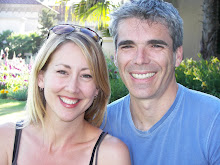I had the absolute pleasure of attending the "Taking Control of Your Diabetes (TCOYD)" Conference here in San Diego this past weekend. It's in its 9th year, and was my fourth time attending. It is a great, empowering day for people to learn more and connect with others around diabetes, and I'm always happy to be a part of it. Rather than try to explain what it's all about, here is a snippet of what a day at TCOYD is like:
Wonderfully, this year they had a "Type 1 Track", with workshops and content aimed specifically for people with type 1 (the people with type 2 had their own, unique track). I was asked to help run a breakout workshop for spouses/partners (another first this year!)... and I was honored to participate.
It was encouraging and extremely validating to share my experience and to hear others' experience of loving someone with type 1. It made me see how much we all have in common, no matter if our partners are men or women, in good control or not, have had diabetes 2 years, 10 years or 50 years! The main commonality of course - the one that had everyone nodding in agreement - was the issue of anxiety ... our anxiety over lows, over our partner driving, over them being home alone with our small kids, over them being okay when we're out of town for work, over them taking care of themselves, over what the future holds... etc... I'm sure you all know what I mean.
Other issues came up as well, particularly with the older participants in the group (although this is still relevant for us all) - for example, how to advocate for your partner to maintain control of their insulin delivery/glucose monitoring if they're in the hospital (and help them advocate for themselves)? We also talked about strategies to be prepared for lows, and best ways to help our loved ones in those moments that they can't take care of themselves.
I think that some of the best discussion came when we started to talk about ourselves, and our own self-care, which often goes to the way-side when we spend so much time worrying about our partner's needs. Oftentimes this can be a weight that we carry that we do not communicate... because why would we? They're the ones dealing with the diabetes, not us, right? However, we also need to realize that type 1 is difficult on us too, and there is no better place to express that than in a supportive group of people who "get it".
For me, one of the biggest parts of this journey of type 1 diabetes in the last 15 years has simply been figuring out my role, and how I fit into the picture. This was another issue that seemed to resonate with the group. How much "control" do I take? How can I best partner with my husband to make this work? How much involvement does he actually need? It's nice to know that others feel the same, and talking about solutions and sharing thoughts is always incredibly helpful. I am grateful to the participants of the workshop (and their brave spouses/partners with type 1 who came to join us!) for being open and sharing their own experiences.
One other thing I want to make sure to mention is that the wonderful non-profit organization the Behavioral Diabetes Institute (who I've referred to many times, since I know the founders and have been involved with it since it's beginnings... and which really is the only organization that deals with peoples' unmet emotional and psychological needs around diabetes), is finally developing an online support program for spouses (I am thrilled)! However, to make this the most impactful and useful program they can, they need your help! The diabetes psychologists behind the program's development (the fabulous Drs. Bill Polonsky and Susan Guzman) have created an online survey to gather as many spouse's/partner's feedback as they can to customize the online support program... and they would welcome (and need) your input! The survey only takes about 10 minutes to fill out, and is wonderful - I've already taken it and given my feedback. You can find the survey here:
Please do fill it out and let your voice be heard. It will only help! The more support out there we can create for us spouses/partners, the better.
I look forward to hearing from you!





